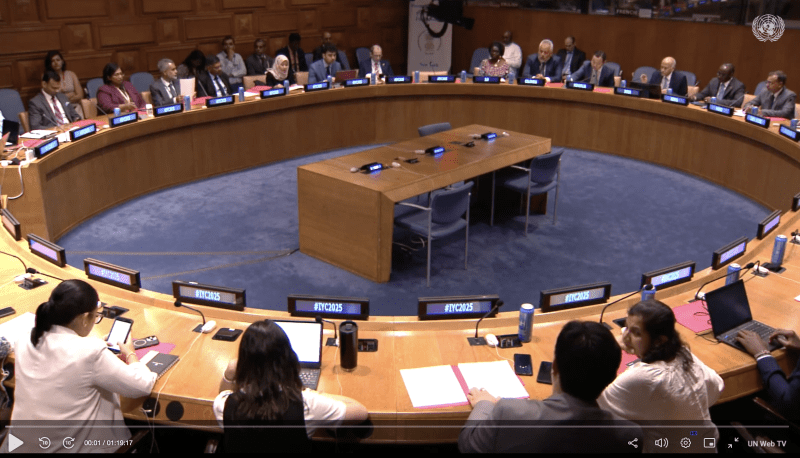
The Permanent Mission of India to the United Nations (UN) celebrated the achievements of cooperatives during an event at the UN’s headquarters on 28 July.
Themed, "Cooperatives and Sustainable Development : Maintaining momentum and exploring new avenues”, the session explored pathways to promote, strengthen and sustain the cooperative movement.
“The values of cooperative enterprises make them directly relevant to sustainable development,” said the Permanent Representative of India to the UN, Ambassador Parvathaneni Harish. He explained that many cooperatives face barriers like limited capital, low visibility and weak institutional support.
“We all need to work for better data, stronger legal frameworks, improve digital access and more professional training,” he said. “Global Partnerships can help close these gaps, sharing knowledge, building cooperative to cooperative linkages and investing in innovation is vital to take the cooperative movement forward,” he added.
India’s Minister of Cooperation, Shri Amit Shah, also addressed delegates via a video message.
“In India, cooperation is a vibrant and community driven system that employs every sector, from consumption to construction, and from rural empowerment to digital inclusion through mutual collaboration and democratic participation,” he said.
India is home to over 840,000 cooperative societies with more than 320 million members.
“The movement has reached every corner of India, powering every village, every woman, every youth and every farmer,” he added.
India’s parliament has recently passed a bill that will enable the establishment of a national co-operative university in Gujarat. The government has also recently launched a co-operative university and adopted a national cooperative policy.
The meeting also heard from International Cooperative Alliance President Dr Ariel Guarco who thanked India for hosting last year’s ICA Global Conference and praised its latest initiatives to grow the cooperative movement.
He encouraged attendees to “work side-by-side” to take advantage of IYC.
“We must fundamentally combine efforts to ensure that the states support and guarantee that cooperatives are recognised explicitly in the political statement of the Second World Social summit to be held in Doha next November.” he added.
Next, Deepak Agarwal from the National Agricultural Cooperative Marketing Federation of India Ltd. (NAFED), described India’s long cooperative history.
“We [NAFED], last year, procured 4.2 million tonnes of food grains from farmers directly, and transferred about 7 billion rupees to their account electronically with a click of the button.”
“We earned $56 million in profit, out of which 15% dividend was paid to the around 800 odd state level cooperative societies which are members of our organisation,” he added.
H.E. Mr. Erastus Ekitela Lokaale, Ambassador/Permanent Representative of Kenya to the United Nations, also addressed the meeting, explaining how cooperatives have acted as a driver of social economic development in the country for more than 100 years.
Like India, Kenya has a dedicated Ministry of cooperatives and MSMEs as well as a cooperative university.
“Cooperatives help to create jobs, stimulate local businesses, build resilient economies and retain wealth within the community,” he said.
He urged all partners and member states to continue proclaiming the role of cooperatives in social development, including at the upcoming World Social Summit.
The event also explored some of the barriers faced by cooperatives. H.E. Mr. Ankhbayar Nyamdorj, Ambassador/Permanent Representative of Mongolia to the UN said these include limited and financial human resources, inadequate access to essential infrastructure, and the absence of long term vision and strategies regarding data management, privacy protection and cyber security.
Mongolia has more than 4,700 cooperatives, with agriculture and livestock being the biggest sectors. The country has taken a series of initiatives in recent years to support the sector, including introducing blockchain to cooperative herder communities and launching a loans programme for cooperatives looking to implement solutions that tackle climate change.
Meanwhile in Colombia cooperatives are helping to formalise popular economy workers who operate informally.
“Our current Government has given renewed and explicit importance to cooperatives within the National Development Plan,” said H.E. Mr. Raúl Esteban Sánchez Niño, Ambassador/Deputy Permanent Representative of Colombia.
Colombia has a strategy for the popular economy through which the government is also working to improve access to inter-operable digital payment systems, enhance financial education, and recognise the legitimacy and scalability of cooperative financial services.
Colombia is also promoting associative models through its National Council for the popular economy and has launched a national initiative to bring cooperative principles into schools and universities.
The final panellists of the session was Cynthia Samuel-Olonjuwon, Special Representative to the United Nations and Director, ILO Office for the United Nations.
She emphasised that only 35% of the Sustainable Development Goals targets are on track, while nearly one in five have regressed.
“The ILO very strongly believes that cooperatives are a concrete part of the solution,” she said.
She talked about the ILO’s support for cooperatives, including via Recommendation 193 of the Promotion of Cooperatives and shared three lessons from the ILO’s work.
“First, cooperatives deliver results. We've had the results, and there are many more around the table, but they deliver results only when policies recognise and support them. Second, their potential is greatest when they are grounded in local realities and needs. Third, unfortunately, their contributions remain undervalued until we count them, until we support them, until we scale them up, we will not get the best out of cooperatives.
“The upcoming World Summit on social development is really an opportunity for us to focus on these lessons and to do so at scale and with greater solidarity,” she said.
The session concluded with an intervention by a representative from Cabo Verde. Participants also watched a video highlighting India’s new online portal for farmers.
The recording of the meeting can be watched here.




